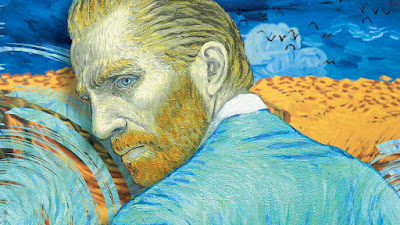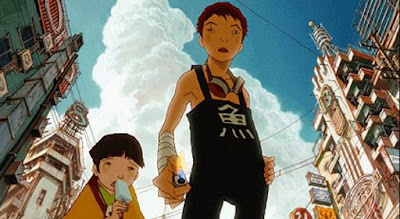Loving Vincent (2017)
Directors: Dorota Kobiela and Hugh Welchman
Cast: Douglas Booth, Saoirse Ronan, Chris O’Dowd
It has always baffled me how artists are unappreciated when they are alive. That whole thing that only after an artist has died do people truly care about their work. If you know anything about the story of Vincent Van Gough, well, then you’ll know he was one of these artists. He had many personal and internal struggles to deal with in life. Was he crazy? Why’d he chop off his ear? Why did he shoot himself? Van Gogh’s life and work has been the focus of many films throughout the years. For example, Paul Cox’s Vincent (1987), Robert Altman’s Vincent and Theo (1990), Vincent Minelli’s Lust for Life (1956) and most recently Julian Schnabel’s At Eternity’s Gate (2018) starring Willem Dafoe as Van Gogh. So, Van Gogh’s life was one filled with all the elements for a good film, tragedy, passion, art, love, poverty, money (or lack thereof), so it’s no surprise so many films have been made about him.
Today I will be talking about Loving Vincent (2017) a film that tells the story of what happened to Van Gogh during his last days on earth, when he committed suicide by shooting himself in the gut. The story unfolds from the perspective of a character called Armand Roulin, the son of a postman who was good friends with Van Gogh. You see, this postman has the last letter that Van Gogh wrote to his brother Theo Van Gogh and so he wants his son to deliver this letter to Van Gogh’s brother. The film unfolds as we meet all the different characters that Armand meets in order to deliver the letter. In the process, Armand gets to know who Van Gogh was and the consequences that led to his demise.
I connected with this movie immediately because it’s about the story of an artist and I am an artist myself, so I am quite sensible to the turmoil’s and tribulations that come with being an artist as well as that special kind of sensibility that we live with, a sensibility that not all possess or understand. Seeing how Van Gogh was bullied and tormented for seeing the world differently, for not being able to fit into that mold that they all wanted him to fit into is heartbreaking. Van Gogh went through many psychological struggles because society didn’t accept him and because he lived mostly in poverty. All Van Gogh wanted was for people to understand how deeply he felt about things, to understand the passion and lust he had for life and beauty. So sad that people would only understand this many years after his death. So, if you are an artist (or an artist at heart) you’ll be able to connect with this film.
But one of the most amazing things about this movie is how it was made. Each frame was hand painted by a group of more than 100 artists from over twenty different countries. The film took four years to complete! Now try and wrap your head around how difficult it is to oil paint every frame of an entire film, all while still trying to tell a compelling and intriguing story! A lot of films can become an exercise in execution and try and impress with how well they were made while losing that all important element, a good story. This does not happen with Loving Vincent, a film that delivers both a good story and an amazing execution. I wanted to know what truly happened with Van Gogh. Did he truly shoot himself or was he murdered? I loved how the film was told like a detective story, as the main character picks up pieces of the story as he tries to deliver the letter.
The fact that every frame of the film was hand painted gives us a very unique looking film. Sometimes we as viewers take so many things for granted because at the end of the day, all we have to do is watch a film. Sometimes we are oblivious as to all the hard work that goes on behind the cameras in order for a film to get made. In the case of Loving Vincent, we shouldn’t take anything for granted because it achieved something that had not been done before to this extent. It’s a film miracle. A wonder to behold.
I loved how the film incorporates so many of Van Gogh’s paintings into the film. Many of his portraits and characters jump to life and walk around many of the beautiful vistas that Van Gogh painted. The film is like seeing all of Van Gogh’s paintings coming to life and breathing, while never losing Van Gogh’s particular style and colors. It’s amazing. I felt like I got to know who Van Gogh was after watching this film and connected with the painter in a more profound way then before. You’ll get to know Van Gogh’s thoughts and feelings because one of the films director’s Dorota Kobiela, made this film after having studied Van Gogh’s painting techniques and analyzing the letters he wrote throughout his life. This is a unique and visually dazzling film, one that requires admiration for how it was made, this isn’t just any old film, it was painstakingly made to give us, the viewers something truly special.
Rating: 5 out of 5




















